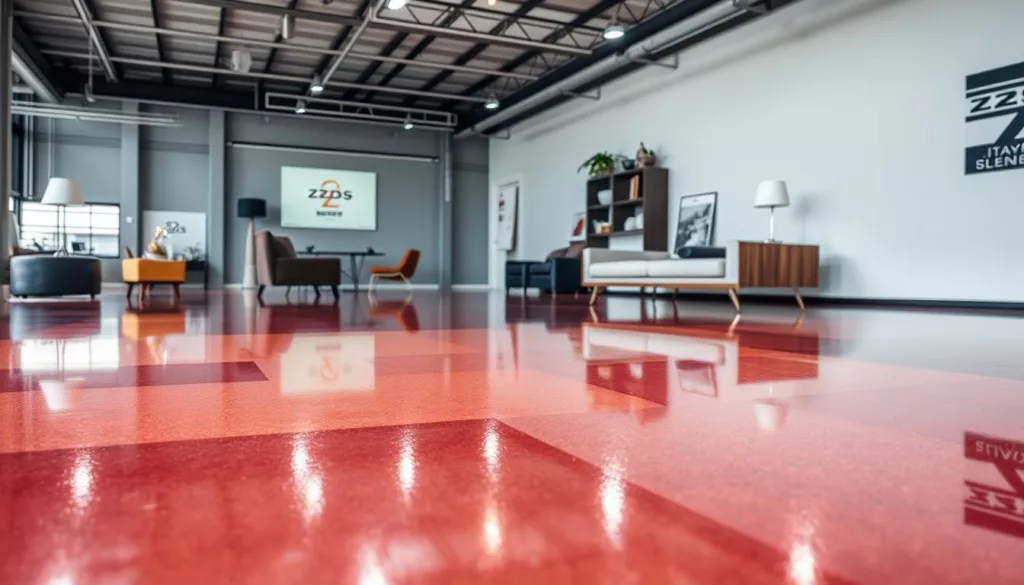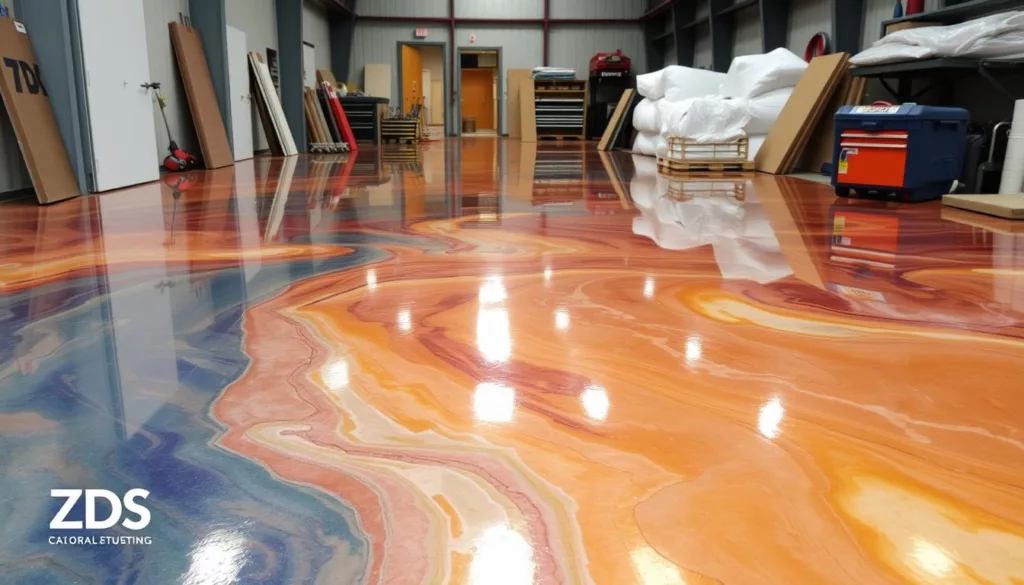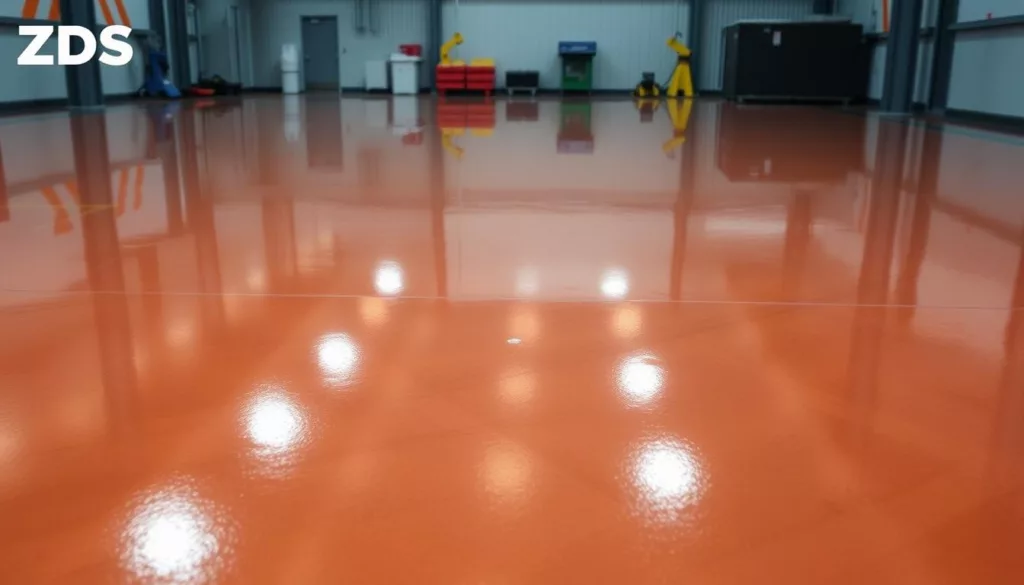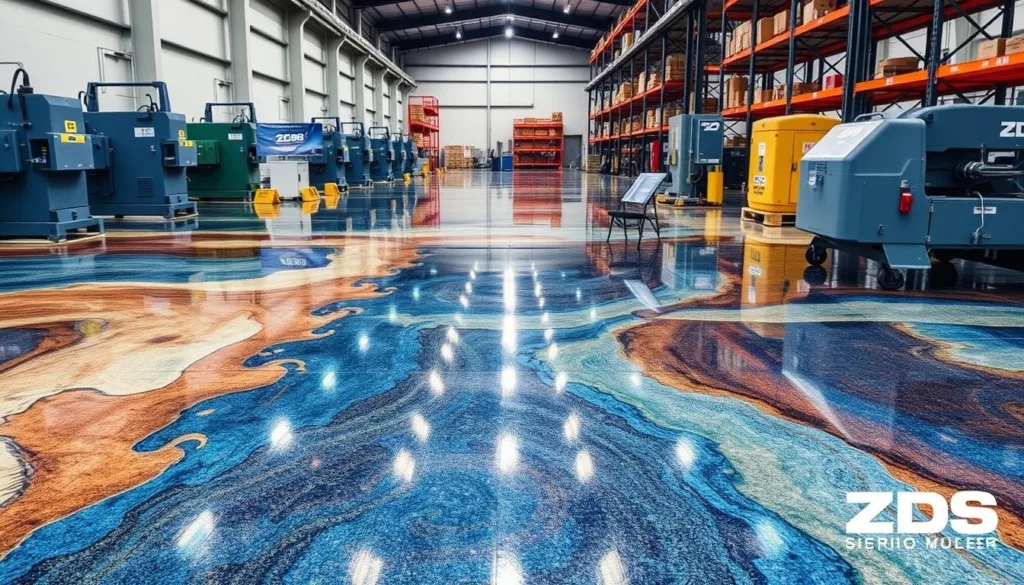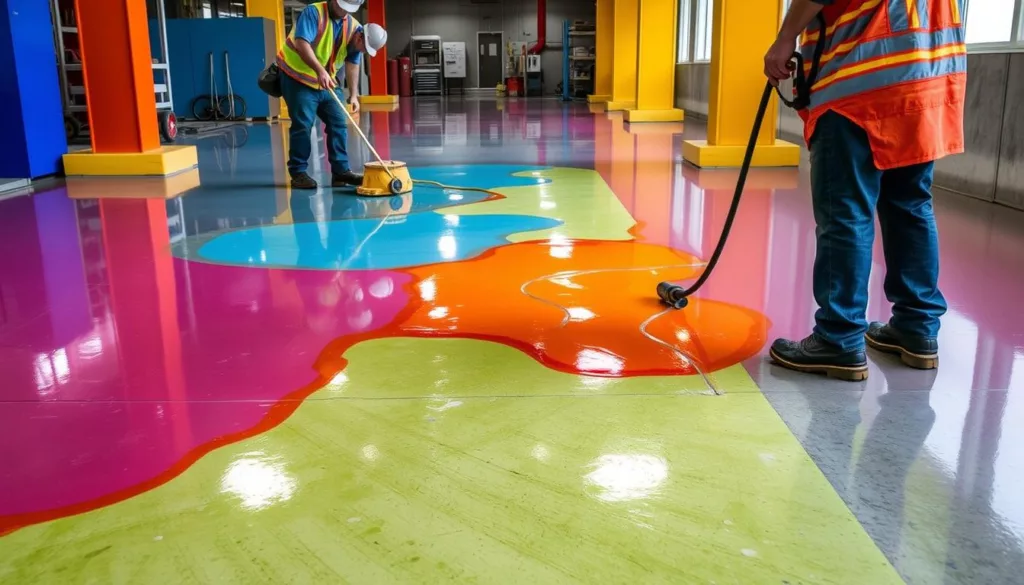Epoxy resin flooring is a durable and versatile option for many spaces. This guide explores its makeup, how it’s made, and the different types available. It’s great for homeowners, facility managers, and construction experts. Knowing about epoxy resin flooring helps you make smart choices.
Key Takeaways
- Epoxy resin flooring is a popular choice for its durability, chemical resistance, and aesthetic versatility.
- The chemical composition, curing process, and types of epoxy systems vary, each with unique properties and performance characteristics.
- Epoxy flooring is widely used in commercial, industrial, and even residential settings, making it a versatile solution for various applications.
- Understanding the benefits, installation process, and cost analysis is key to deciding if epoxy flooring is right for you.
- Proper maintenance and care guidelines ensure the longevity and performance of epoxy resin flooring systems.
Understanding Epoxy Resin Flooring Basics
Epoxy resin flooring is a strong and versatile option for many commercial and industrial areas. It’s important to know its chemical makeup, main parts, and how it cures to become a lasting, dependable floor.
Chemical Composition of Epoxy
Epoxy is a type of thermoset polymer made from epoxy chemistry. It’s made of a resin and a hardener. The resin is usually a bisphenol-A or novolac-based compound. The hardener, often an amine or anhydride-based substance, starts the curing process.
Core Components and Curing Process
The curing process of epoxy resin is key to its strength and durability. When the resin and hardener mix, a chemical reaction happens. This turns the liquid into a solid, tough floor.
Primary Types of Epoxy Systems
Epoxy resin flooring comes in many epoxy types, each with special properties and uses. From 100% solids epoxy to water-based and solvent-based types, there’s a choice for every need in commercial and industrial spaces.
“The chemical composition and curing process of epoxy resin are the foundation for its unparalleled strength and durability as a flooring solution.”
What’s Epoxy Resin Flooring and Its Significance
Epoxy resin flooring is a durable and versatile option that’s become very popular. It’s a floor coating made from epoxy resins and hardeners. Epoxy floor definition covers many uses, from offices to homes.
The importance of epoxy flooring is clear. It offers a smooth, lasting, and attractive surface. Epoxy floors are known for their durability, resistance to chemicals, and easy upkeep. They’re great for places with lots of foot traffic.
“Epoxy resin flooring has become an increasingly sought-after solution for its remarkable performance and aesthetic appeal.”
Epoxy resin flooring is loved for its many benefits. It works well in many places, from factories to stores. Epoxy floors add beauty and function to any area.
If you own a business, manage properties, or live in a home, knowing about epoxy flooring is key. It helps you choose the right flooring for your needs. By learning about epoxy’s benefits and uses, you can improve your spaces and add value.
Benefits of Epoxy Flooring Systems
Epoxy flooring is a top choice for many reasons. It’s durable and looks great, making it perfect for many places. It’s great for both work and play areas.
Durability and Longevity Features
Epoxy floors are known for lasting a long time. They can handle a lot of wear and tear. This means they stay looking good for years.
They’re perfect for places that get a lot of use. Here, you need floors that can take it.
Chemical and Impact Resistance
Epoxy floors are also very good at resisting chemicals and impacts. This is great for places where spills or harsh chemicals are common. Labs and workshops are good examples.
They also protect the floor from damage. This keeps the floor looking smooth and even.
Aesthetic Versatility
Epoxy floors can be made to look any way you want. You can choose colors, designs, and finishes. This lets you create a floor that looks amazing and fits your style.
Epoxy floors are not just durable and resistant. They also look great. This makes them a game-changer for any space.
Common Applications in Commercial Spaces
Commercial epoxy flooring is a top pick for many spaces like retail stores, offices, and public buildings. It’s tough, can handle chemicals, and looks great. This makes it perfect for places that get a lot of use and need floors that last a long time.
In retail environments, commercial epoxy flooring gives a smooth, safe surface. It can handle lots of people and heavy things, common in malls and shops. You can choose from many colors and designs to match your store’s look.
For professional office spaces, office epoxy floors are a smart choice. They have a finish that doesn’t glare and can handle big furniture and equipment. This keeps your office looking clean and professional, helping everyone stay focused and productive.
In public buildings like schools, hospitals, and government offices, retail floor coating is chosen for its toughness and easy upkeep. Epoxy floors are safe and can be colored to make spaces bright and welcoming for everyone.
“Epoxy flooring has become the go-to choice for modern commercial spaces, combining functionality, beauty, and lasting quality.”
Looking to make your retail space more appealing, your office more professional, or your public area safer and more inviting? Commercial epoxy flooring is a smart, adaptable choice for many commercial needs.
Industrial Uses and Performance Standards
Epoxy flooring is the top pick for tough industrial settings. It’s strong and works well in many places, like factories, warehouses, and labs.
Manufacturing Facilities
In factories, industrial epoxy flooring is unmatched. It’s tough and can handle chemicals and heavy use. This keeps the floor safe and in good shape.
Warehouse Applications
Warehouses need floors that can take a lot of wear and tear. Warehouse epoxy flooring is great for this. It’s also easy to clean, keeping the area tidy.
Laboratory Environments
Labs have special needs for their floors. Laboratory flooring made from epoxy is perfect. It resists chemicals and keeps the floor clean, which is key for research.
Epoxy flooring is a top choice for many industrial uses. It’s strong, easy to clean, and looks good. It makes workspaces safer and more efficient.
Installation Process and Requirements
Starting a epoxy floor installation project is exciting. But, knowing the process and what you need is key. The first step is to prepare the surface well. This ensures your floor lasts long and looks great.
- Surface Preparation: Clean and degrease the concrete. Then, grind or shot blast it to make a textured surface. This helps the epoxy application stick well.
- Epoxy Application Techniques: Experts apply the epoxy in thin, even layers. They let each layer cure before adding the next. This makes the floor strong and durable.
- Curing Time: Epoxy floors need 24-48 hours to be ready for walking. They take up to 7 days to fully harden and resist chemicals. Be patient during this time.
Doing an epoxy floor installation project needs careful attention and following best practices. Working with a trusted company like ZDSpoxy ensures a smooth process. You’ll get a beautiful, lasting epoxy floor that meets your high standards.
“Proper surface preparation is the foundation for a successful epoxy floor installation. Take the time to do it right, and you’ll be rewarded with a durable, stunning finish.”
Cost Analysis and ROI for Epoxy Flooring
Thinking about epoxy flooring? The cost upfront is key. But, the long-term savings and benefits make it a smart pick for many places. Looking at the total cost and return on investment (ROI) helps businesses decide wisely.
Initial Investment Considerations
The epoxy flooring cost changes based on size, epoxy type, and installation. Costs range from $3 to $12 per square foot. Even though it’s a big start, epoxy’s long-term gains often outweigh the initial cost.
Long-term Value Assessment
The ROI of epoxy floors is high because they last long and need little care. With the right upkeep, they can last 10 to 20 years or more. Plus, their easy maintenance means big savings over time.
Maintenance Cost Savings
- Epoxy floors need little cleaning and care, saving on maintenance costs.
- The smooth, non-porous surface resists stains and chemicals, cutting down on deep cleaning needs.
- They’re tough, handling lots of foot traffic and equipment without wearing down, saving on upkeep costs.
By looking at the initial cost, long-term benefits, and maintenance savings, businesses can choose wisely. Epoxy’s durability, low upkeep, and cost-effectiveness make it a top choice for many.
Maintenance and Care Guidelines
To keep your epoxy floor looking great, you need to take care of it regularly. Follow these tips to make sure your epoxy floor stays in excellent shape for many years.
Cleaning Epoxy Floors
Keeping your epoxy floor clean is key to epoxy floor maintenance. Use a gentle, pH-neutral cleaner and a soft-bristle mop or brush. Stay away from harsh chemicals or abrasive cleaners, as they can harm the epoxy. Rinse the floor well with clean water and let it dry completely.
Preventive Measures
- Use mats or runners in busy areas to protect the epoxy coating from heavy foot traffic, impact, and abrasion.
- Clean spills right away to avoid staining or discoloring the epoxy coating.
- Check the floor often for cracks, chips, or wear. Fix any issues quickly to keep the epoxy floor’s integrity.
Ongoing Maintenance
To keep the epoxy coating in good shape, follow these best practices:
- Deep clean and re-seal the epoxy floor every 1-2 years, depending on how much it’s used.
- Apply a new coat of epoxy sealant or polish to bring back the shine and preserve the epoxy coating.
- Fix any small repairs, like filling cracks or patching chips, as soon as you notice them to prevent more damage.
By sticking to these epoxy floor maintenance tips, your epoxy floor will stay strong, easy to clean, and look great for years.
| Maintenance Task | Frequency | Benefits |
|---|---|---|
| Routine Cleaning | Weekly or Bi-weekly | Maintains cleanliness and preserves the epoxy coating |
| Deep Cleaning and Re-sealing | Annually or Bi-annually | Restores shine and protects the epoxy floor from wear and tear |
| Minor Repairs | As Needed | Prevents further damage and maintains the integrity of the epoxy floor |
“Consistent and proper maintenance is the key to preserving the beauty and longevity of your epoxy floor.”
Environmental Impact and Safety Features
Flooring solutions must consider the environment and safety. Eco-friendly epoxy flooring systems are at the forefront. They offer sustainable and safe floor coatings.
VOC Compliance
Low VOC flooring meets strict VOC regulations. These sustainable floor coatings release fewer harmful chemicals. This makes indoor spaces healthier for everyone.
Sustainable Practices
Eco-friendly epoxy makers use sustainable methods. They choose renewable or recycled materials. They also use energy-efficient ways to cut down carbon emissions.
Safety Certifications
Safety-certified epoxy flooring systems are tested thoroughly. They meet high standards for slip resistance, chemical resistance, and durability. This ensures a safe and lasting solution.
“Sustainable flooring solutions are no longer a luxury, but a necessity in today’s environmentally conscious world.”
Eco-friendly epoxy flooring systems lead the way. They focus on environmental impact and safety. This sets a new standard for floor coatings, aiming for a greener and safer future.
Comparing Epoxy to Alternative Flooring Solutions
Choosing the right flooring for your commercial or industrial space is a big decision. You might be thinking about epoxy, concrete, or tile. Epoxy resin flooring is a top choice, known for its unique benefits.
Epoxy is known for its durability and long life. It’s better than concrete because it doesn’t get porous or crack easily. It’s also great for places with lots of foot traffic, like factories and kitchens.
Epoxy also beats tile in looks. You can choose from many colors and designs. This makes your floor look unique and easy to keep clean.
| Flooring Option | Durability | Chemical Resistance | Aesthetic Versatility |
|---|---|---|---|
| Epoxy Resin | Highly durable and long-lasting | Excellent resistance to chemicals and spills | Extensive customization options |
| Concrete | Can become porous and crack over time | Limited resistance to chemical spills | Restricted customization options |
| Tile | Moderately durable, but susceptible to cracking and chipping | Varying resistance to chemicals depending on tile type | Limited customization options |
Epoxy resin is the best choice for industrial flooring. It’s durable, resistant to chemicals, and looks great. It’s perfect for upgrading your space, whether it’s a factory, warehouse, or office.
“Epoxy resin flooring is the ultimate solution for industrial and commercial spaces that demand both function and form.”
ZDSpoxy’s Professional Installation Services
Getting a perfect epoxy flooring finish depends on the installation. At ZDSpoxy, they know how important epoxy installation is. Their skilled team works hard to make sure your epoxy flooring looks great and lasts long.
Expert Application Process
The ZDSpoxy team uses a detailed, step-by-step process for a flawless finish. They prepare the surface well, mix the epoxy resin carefully, and apply it smoothly. This ensures a glossy, durable surface. Their focus on quality epoxy application makes them the top choice for flooring projects.
Quality Assurance Measures
ZDSpoxy is proud of their work and the quality of their professional epoxy installation. They check every step to make sure the result is perfect. Their commitment to excellence means they deliver floors that are both beautiful and durable.
Customer Support Services
ZDSpoxy doesn’t stop at installation. They offer customer support services like maintenance tips and quick help with any issues. Their team is always ready to help, keeping your epoxy floors looking great for years.
“ZDSpoxy’s professional installation services have been invaluable. Their attention to detail and commitment to quality have transformed our facility, and we’re thrilled with the long-lasting results.”
| Service | Description | Benefits |
|---|---|---|
| Professional Epoxy Installation | Experienced team follows a meticulous, multi-step application process to ensure a seamless and high-quality finish. | Durable, long-lasting, and aesthetically pleasing epoxy floors that exceed expectations. |
| Quality Assurance Measures | Stringent quality control procedures, including rigorous inspections and testing, to guarantee superior results. | Confidence in the quality and performance of the installed epoxy flooring system. |
| Customer Support Services | Comprehensive guidance on maintenance and care, as well as prompt response to inquiries and concerns. | Ongoing support to ensure the longevity and optimal performance of the epoxy flooring. |
Conclusion
Epoxy resin flooring is a top choice for many reasons. It’s durable and long-lasting, and it can handle chemicals and impacts well. This makes it perfect for both commercial and industrial spaces.
It’s great for places like factories, warehouses, and labs. Epoxy floors are strong, versatile, and safe. Plus, getting them installed by pros means they’ll last a long time and look good.
Thinking about new flooring? Epoxy is a smart pick. It offers many benefits, is easy to choose, and pros can install it well. It can make your space better, more efficient, and valuable for years.
FAQ
What is the chemical composition of epoxy resin flooring?
Epoxy resin flooring is made of two parts: a resin and a hardener. When mixed, they react to form a strong, lasting, and resistant flooring material.
What are the primary types of epoxy flooring systems?
There are three main types of epoxy flooring systems. These include solvent-based, water-based, and 100% solid epoxy systems. Each type has unique properties and performance, making them suitable for different uses.
Why is epoxy resin flooring significant?
Epoxy resin flooring is popular for both commercial and residential use. It’s known for its durability, chemical resistance, and beauty. It’s a customizable and long-lasting option for many settings.
What are the key benefits of epoxy flooring systems?
Epoxy flooring offers many benefits. It’s very durable and long-lasting. It also resists chemicals and impacts well. Plus, it can be made to look attractive and customizable.
Where are epoxy floors commonly used in commercial spaces?
Epoxy flooring is used in many commercial places. This includes retail stores, offices, and public buildings. It’s great for areas with a lot of foot traffic because it’s easy to clean and resistant to stains and chemicals.
How are epoxy floors used in industrial environments?
In industrial settings, epoxy flooring is a top choice. It’s used in manufacturing facilities, warehouses, and labs. It meets high performance standards, resists chemicals, and ensures safety.
What is the installation process for epoxy flooring?
Installing epoxy flooring starts with preparing the surface. This might involve grinding or shot blasting. Then, the epoxy coating and decorative elements are applied. The curing time depends on the specific system used.
How do the costs and return on investment (ROI) of epoxy flooring compare to other options?
Epoxy flooring might cost more upfront than some other options. But, its long-lasting nature and low maintenance needs can save money in the long run. This makes it a good investment.
What guidelines should be followed for maintaining and caring for epoxy floors?
To keep epoxy floors in good shape, clean them regularly. Use the right cleaning products. Also, take steps to protect the epoxy coating. Following these tips can help your floors last longer.
How does epoxy flooring compare to other flooring solutions in terms of environmental impact and safety features?
Epoxy flooring is a green and safe choice compared to other options. It has low VOC emissions and is made sustainably. It also meets safety standards, making it a better option for the environment and users.

